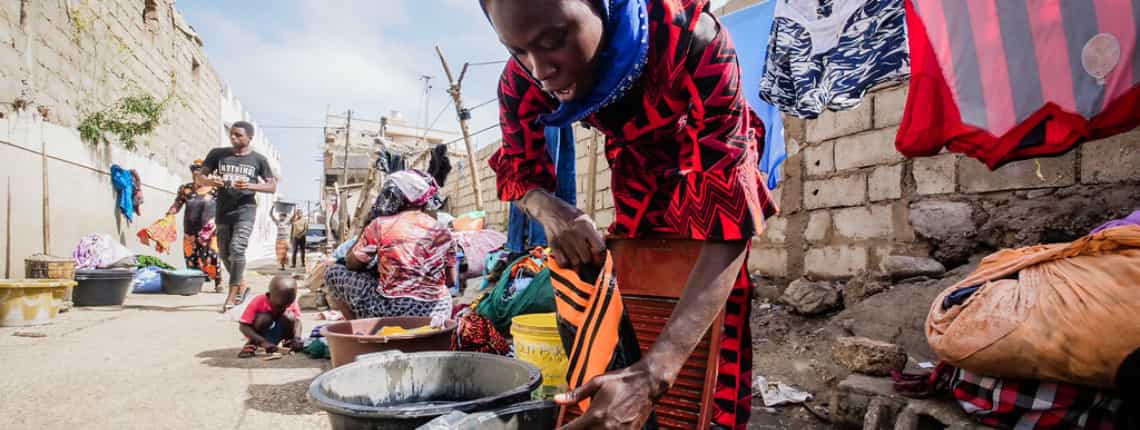The clock is ticking on the road to meeting the Sustainable Development Goal (SDG) targets by 2030. Governments everywhere are strategizing and implementing to reach these and other global benchmarks. But are top-down solutions suitable for bringing much-needed change to complex social, economic and environment challenges?
The working poor face these challenges every day and often have the keenest insight into ways forward. That’s why it’s essential for decision-makers to listen to, and include, the people most impacted by poverty, climate change and social and political exclusion.
We’ve highlighted five ways grassroots organizations of women workers are leading the charge to a more equitable and sustainable future. In WIEGO’s network of membership-based organizations of workers — led primarily by women street vendors, waste pickers, home-based workers and domestic workers — we have witnessed remarkable efforts to think and act both innovatively and pragmatically to make cities more inclusive and just — from redefining public spaces to challenging gender norms to modelling democratic principles and practices.
For cities to make progress on SDGs and the New Urban Agenda, they must listen to grassroots’ solutions
By Jenna Harvey
The 2030 Agenda for Sustainable Development (SDGs) and the New Urban Agenda (NUA) have put forth a vision of cities with vibrant public spaces, clean environments and robust civic participation. These are areas where cities are struggling, and governments, academics and other stakeholders have debated at length on how best to approach implementation and monitoring.
Organizations of informal workers and allies have been hard at work trying to put these standards into practice by themselves. Here we will show how governments in these cities could partner with worker organizations to demonstrate real and measured progress on the multiple goals contained within the SDGs and the post-2015 agenda. Read more.
Working poor women are redefining how to achieve gender equality
By Ana Carolina Ogando
In our work at WIEGO, we see that working poor women in the Global South face a complex set of barriers to equality that go beyond gender discrimination. Women in the informal economy face ingrained social and economic structural barriers. Their lives are shaped by multiple intersecting power relations marked by class, caste, religion, race and ethnicity.
In addition to gender oppression, such forms of discrimination further marginalize these women, making the march toward equality and economic empowerment an even bigger battle — but women from Delhi to Dakar are addressing discrimination in their own game-altering ways. Read more.
Sisterhood: How solidarity led Indian women to take on gender discrimination
By Avi Majithia and Carlin Carr
In the Delhi slum of Rajiv Nagar, Nazma earns additional income for her family by tailoring women’s shirts (“kurtas”) and skirts and accessorizing some of it with her highly specialized sequining skills. She works steadily to complete orders, often for tight timelines.
These orders used to be handed down from sub-contractors, all of whom were men, who set all the demands, but Nazma banded together with the women in her area to change that dynamic — and, over time, has made enormous progress in changing local gender dynamics. Read more.
In times of crisis, grassroots organizations re-imagine democratic practice
By Jenna Harvey and Ana Carolina Ogando
Democratic norms are under threat worldwide. Informal workers and other marginalized groups are witnessing the reversal of hard-fought wins for increased participation and rights. But worker organizations are organizing and employing innovative strategies to advance democratic practices. Read more.
Women informal workers challenge invisibility in Dakar
By Jenna Harvey, Ana Carolina Ogando, Carlin Carr, Adama Soumare, Maguette Diop
In Dakar, Senegal, women continue to face economic and social inequities — from illiteracy to poverty to gender discrimination — but it’s also true that change is happening. Informal women workers have decided that they can improve their position if they join hands with other women and organize to acquire new skills and assert their leadership.
They are addressing the challenges they face in their work and in their communities and gaining much-needed leadership training and to strengthen their collective voice. With these resources, women are proactively challenging the status quo to be sure their voices and demands are heard near and far. Read more.
Feature photo: By organizing, women in India are gaining more power in their working spheres, in their municipalities, and in their country. Photo: WIEGO
